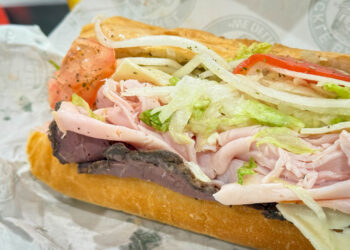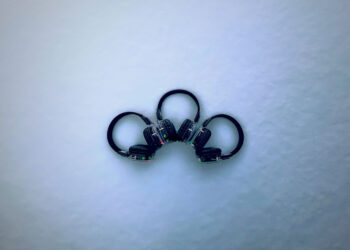By Scott Mechura EBS Food Columnist
People often say their favorite things about camping or spending time outdoors are the scents and sounds of nature. I couldn’t agree more, though there is a sight and sound that often dominates that outdoor landscape: sizzling bacon.
If you think about it, bacon is the equivalent of ground beef.
Ground beef, or burger is generated from a large portion of a cow that would otherwise not get used. They are generally undesirable due to the cuts lack of tenderness.
Other than chef’s utilization of pork belly, it doesn’t have a home for the average consumer, other than seasoning it and slow smoking to create bacon.
However, bacon does have quite a long history.
As with many foods, bacons origins appear to date back to the Chinese, who salted and cured the bellies of pigs as early as 1500 B.C.
Though not fully documented, there is historical speculation that the Romans and Greeks learned of the process of salting and curing pork belly in their Middle East conquests, ironically. The irony being today, that is the highest concentration of the Muslim and Jewish faiths, who do not eat pork.
And though Columbus is credited with bringing pigs to the Americas under the instruction of Queen Isabella, the National Pork Board credits famed explorer Hernando De Soto with introducing 13 pigs to the new world in 1539.
Etymology is a little foggy, but most sources trace the word to the Germanic word “bakkon”, meaning back meat. Also ironic, considering today bacon is made from the belly, or “front”, rather than the back.
Save for the aforementioned Muslim and Jewish faiths, bacon, or some form of treated pork belly, is consumed virtually everywhere in the world. Though it is Americans that seem to hold it in as high regard as football, fireworks and apple pie.
As foods come and go, as trends hit their pinnacle and fade away, as new cooking methods, equipment and tools make professional and home cooking better and easier than ever, bacon remains front and present.
We make t-shirts about it. We have specific bacon cooking contests. We even joke that it is the lone food that prevents many of us from eating vegetarian. And unofficial surveys tell us that roughly two-thirds of Americans are in favor of designating bacon as our national food.
So, as I woke up this morning at my campsite and took my early walk around, it was the smell of bacon that quickly overtook the aromas of both a crisp summer Montana morning, and my cup of pleasantly warm green tea.
It was everywhere. The sound and smell of bacon. From early morning campfires to table-top burners to inside campers and motorhomes. I became aware of just how many people in America enjoy bacon.
And just as I was coming to this realization, I heard a mother standing over her outdoor cook top ask her daughter in that parental voice eluding to the idea, ‘You are crazy,’ as well as sends the message that you are going to eat what I made for breakfast; ‘Sweetie, who doesn’t like bacon?’
Scott Mechura has spent a life in the hospitality industry. He is a former certified beer judge and currently the executive chef at Buck’s T-4 Lodge in Big Sky.














